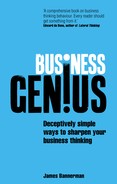The sixth Block and Limitation to Business Genius is insufficient influence. This doesn’t mean we have to have the charisma of JFK, or the hypnotic powers of Rasputin, to excel at work. It simply means our ability to influence others is a supremely useful skill and, without it, we’re unlikely to soar too high in the world of business.
So what’s the secret?
Well, weirdly enough, it’s reminding ourselves that effective influence is not just about getting others to do what we want them to do.
On the contrary.
As Dale Carnegie – who wrote the 1937 classic How to Win Friends and Influence People – smartly observed: ‘There is only one way to get anybody to do anything, yes, just one way, and that is making the other person want to do it.’
If we want to become Genius influencers, the trick is to view a situation from the other people’s perspective before we expect them to see it from ours. In other words, instead of being rigidly self-centred, we need to be more flexible (in our thinking and behaviours) so we can flow …
In fact, that’s precisely where the words influence and affluence come from.
Back in Roman times influere meant ‘to flow into’ so, when we influence other people, our thoughts, ideas and opinions literally flow into them and, when we’re influenced by other people, their thoughts, ideas and opinions literally flow into us.
Insufficient influencers, however, frequently overlook the value of flow !
As a result – according to brainwashing and mind technician expert Kathleen Taylor – they accidentally trigger a part of the human brain called the prefrontal cortex (the PFC), which enables us to stop and think when we feel we’re being tricked, taken advantage of and dragged in a direction we’re reluctant to go in.
Forgive me if this sounds like psychological gobbledegook, but it’s important: if you’ve ever come across someone in the workplace who’s refusing to budge an inch, and is as stubborn as a mule, this is why!
So, if you want to become a highly skilled influencer you’ll need to flow around other people’s PFCs (rather than bang into them).
So here are two top tips to help you achieve this:
- Build rapport. Invest time in building rapport (i.e. harmonious social interaction) with the person you want to influence. In other words, actively listen to them, take a genuine interest in what they’re saying, and do your best to mirror and match their words and body language as much as possible (without sounding like a parrot, or prancing around like Marcel Marceau, the Genius mime artist). Besides, who would you rather do business with? Someone you like and trust – because they speak your language – or someone you don’t? By the way, if you really want to master the subtle nuances of rapport-building, I suggest you read plenty of neuro-linguistic programming (NLP) books because they often excel in this area. If you’re simply looking for a quick shortcut, however, just imagine that the person you aim to influence has an invisible sign over their head that reads: ‘Help me feel important!’ Help them do this – honestly and authentically – and you can bet your bottom dollar the rest will flow from there …
- Project passion. It could be argued that teaching is one of the most uber-influential professions on the planet. What separates great teaching from average teaching, however? Well, evidently, it’s not just subject knowledge or decades of experience … it’s passion! So please bear this in mind if you want to UP! your influence at work. Get passionate about whatever it is you’re selling, making or doing (and influencing others will start to become a whole lot easier). After all, would the Rolling Stones have been so influential if they hadn’t been so passionate about rock ’n’ roll? Would Steven Spielberg have been so influential if he hadn’t been so passionate about the world of film-making? And would Enzo Ferrari (1898–1988) have been so influential if he hadn’t been so passionate about auto design and racing cars?


UP! YOUR INFLUENCE
NUGGET
Many Business Geniuses have been hugely influential over the years.
Think of J. P. Morgan, for example, and his influence on investment banking; or William Shakespeare and his influence on theatre and literature; or Igor Sikorsky and his influence on helicopter travel. Likewise, if we glance around the globe – from India to China to Spain – it’s easy to see Lakshmi Mittal’s influence on the steel industry, or Wang Jianlin’s influence on real estate, or the founders of Zara, Rosalia Mera and Amancio Ortega’s influence on high-street fashion …
Few Business Geniuses, however, even come close to the far-reaching influence of Walt Disney!
From his many magical movies (for which he received 22 Oscars) to his innovative theme parks, and from his influence on everything from animated computer games to popular culture, no wonder Disney’s biographer Neal Gabler once wrote: ‘He changed the world.’
Walt Disney’s Genius, however, might never have seen the light of day if he’d listened to his critics and allowed them to tread on his dreams. Back in the 1930s, for example, dissenters of his Snow White project referred to it as ‘Disney’s Folly’, because they considered the idea of a full-length animated feature film (which had never been attempted before) to be utterly absurd! They naturally assumed the bright colours would be too distracting, and that children wouldn’t be able to concentrate for such a long period of time. Disney, however, refused to be influenced by this way of thinking, and went on to create his multi-billion dollar entertainment empire. No wonder Disney once said: ‘I only hope that we don’t lose sight of one thing – that it was all started by a mouse.’ Yup. If Mickey Mouse could be this influential, who knows what you could do?


USEFUL TIPS AND
ESCAPE STRATEGIES
Against this backdrop, here are three useful tips and escape strategies you may want to explore to help you UP! your influence:
1 ALWAYS SAY ‘BECAUSE’
Back in the 1970s a Harvard psychologist called Professor Ellen Langer conducted an experiment with people in an office who were queuing up to use a photocopying machine (as they did in those days!).
An actor would run up to the front and queue barge, but use different excuses. When he ran up and said, ‘Excuse me, I have five pages. May I use the photocopier?’ he was 60 per cent successful. By contrast, when he ran up and said the same thing, but added, ‘because I’m in a rush’, he was 94 per cent successful.
Langer’s key finding, however, emerged after the line, ‘Excuse me, I have five pages. May I use the photocopier because I have to make some copies’ was used.
Amazingly, this turned out to be 93 per cent successful, even though it was blatantly obvious that they’d need to ‘make some copies’ if they were going to use the photocopier. This led Langer to conclude that it was the word because that made the crucial difference, not what came after it.
So bear this in mind next time you want to influence someone.
Give people a because before they ask for one. So, instead of saying, ‘Please can I have three minutes of your time’ say, ‘Please can I have three minutes of your time because …’ It won’t always work, but it’ll definitely help because we usually like to know why we’re being asked to do something before we end up saying ‘yes’ to it!
2 GIVE TO GAIN
Influence guru Robert Cialdini highlights how there are six ‘weapons of influence’ to sway people’s thinking.
For example, sales people often use the weapon of scarcity, e.g. they let a customer know it’s the last one left in the shop to prompt them to snap it up quickly, before someone else does.
Sports marketing professionals, meanwhile, often rely on the weapon of liking, e.g. they leverage the popularity and likeability of sporting heroes to champion certain brands, to tempt their fans to wear the same sunglasses or football boots, too.
One of the most widely used weapons of them all, however, is reciprocity, i.e. the principle of ‘we get what we give’.
Ever noticed, for example, how, if you buy someone a drink in a bar, they’re more likely to buy you one? Or, if you help a colleague at work, they’re more likely to help you in return? Of course it doesn’t always work – because some people are pathologically selfish – however, keep giving this a go and see where it takes you.
Besides, reciprocal arrangements have been going on in business since time immemorial. Take the Royal Navy, for example, where back in the 1800s sailors used to say, ‘You scratch my back, and I’ll scratch yours.’
The reason they said this was because naval discipline was brutal back then, and sailors could easily get whipped for doing the slightest thing wrong. On a long sea journey, however, if you were given orders to whip someone else’s back (with a whip called a cat-o’-nine-tails, which used to leave nasty ‘scratch’ marks), sooner or later you’d probably be the one to make a mistake, and they’d end up ‘scratching’ you. So, in terms of influence, sailors soon realised it was smarter to come to a reciprocal arrangement: go easy with me, and I’ll go easy with you …
3 SWAP THE BAIT
Finally, we need to remember that influence and motivation are closely connected. Or, to put it another way, if someone’s demotivated (i.e. they lack hope and desire) influencing them is going to be hard work!
So, why not give yourself a break, and find out what really motivates the other person before you attempt to influence them. If they’re motivated by money, for example, make sure the bait on your hook is money; if they’re motivated by recognition, make sure the bait on your hook is recognition; if they’re motivated by spending more time on activities of their choice, make sure the bait on your hook is an opportunity for them to spend more time on activities of their choice. Yes, it might sound manipulative. However, it’s really more about connecting (or what persuasion expert James Borg calls ‘listening with your heart’) than manipulating. Or, to put it another way, it’s doing what message strategist Chris St Hilaire refers to as ‘recognising their reality’.
For, as David Lloyd George – the former British Prime Minister (1916–1922) – used to say: ‘Bait the hook to suit the fish!’

BUSINESS GENIUS IN ACTION:
NEXT STEPS …
In summary, if you want to UP! your influence, here’s how:
- Pinpoint the difference rapport can make (for people in business usually don’t need a good talking to, they need a good listening to, so focus on entering into their world first, before you expect them to enter into yours).
- Investigate smarter ways of giving (and, no, this doesn’t mean giving dodgy back-handers! It simply means reciprocation can often be a highly powerful weapon of influence because, if your colleagues know you are there for them – as Brent and Dent make clear in their book The Leader’s Guide to Influence – they’ll be more likely to be there for you).
- Leverage the power of passion (because – as we saw with Ferrari – passion is often contagious when it comes to selling business products, services and ideas. Besides, if you can’t influence yourself, how on earth can you be expected to influence others?).
- Orchestrate a plan to ‘Bait the hook to suit the fish’ (for when it comes to effective influence there is no magic wand or one-size-fits-all solution that will work for everyone. The secret is to keep flexing your approach, and concentrate on what others most want).
- Target the word ‘because’ (because it will help you to fly around people’s PFCs! So, instead of saying, ‘Please can you finish this report by the end of Thursday’, say ‘Please can you finish this report by the end of Thursday because I promised the senior management team I’d let them see it first thing Friday morning.’ It’ll be far more convincing!).
